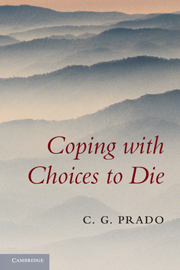3 - Culture’s Elusive Role
Published online by Cambridge University Press: 05 June 2012
Summary
There are two sorts of cultures the components of which influence electors’ reasoning and motivation regarding elective death and survivors’ perceptions and assessments of electors’ choices to die. The familiar sort is made up of what I called “iconic” cultures in Choosing to Die. These are the interwoven ethnic, regional, and religious values, the social behavioral standards and familial structures, and the ritualistic observances and day-to-day practices that we collectively describe as “Western European culture,” “Asian culture,” “Hispanic culture,” and the like. The less familiar sort of culture is made up of what I dubbed “coincidental” cultures in Choosing to Die. These are interwoven sets of values, standards, and practices, as are iconic cultures, but coincidental cultures differ from iconic ones because they arise not from ethnic or religious roots or historical circumstances, but from people coming together in pursuit of a common objective. This is why coincidental cultures usually cut across iconic boundaries in that their members often are members of diverse iconic cultures.
Coincidental cultures may and do arise wholly within iconic cultures, with all their members sharing the same iconic values, standards, and practices in addition to coincidental ones. The most evident cases of intra-iconic coincidental cultures are those shared by members of groups who share particularly strict or extreme interpretations of their common iconic cultures, and who are united primarily by their zeal to defend and propagate their interpretations. However, coincidental cultures internal to particular iconic cultures are not of immediate relevance to our concerns since our main interest is in disparities and conflicts between iconic and coincidental cultures, not interpretive disputes within iconic cultures.
- Type
- Chapter
- Information
- Coping with Choices to Die , pp. 51 - 69Publisher: Cambridge University PressPrint publication year: 2010



